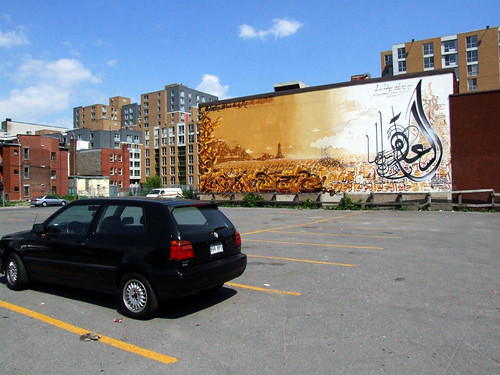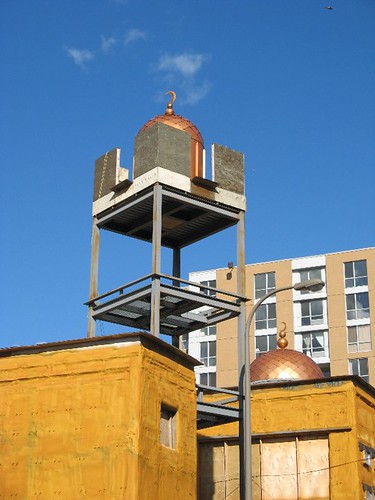
New mural on a mosque near the Main and Ste. Catherine
In last week’s issue of the Economist, a couple of interesting articles looked at the challenge of building mosques in Western cities. All too often, it seems, cities and neighbourhoods in Europe and North America become divided when faced with the possibility that a minaret might rise on the horizon. What is it, though, that scares people about mosques? Is it the fear of terrorism fed by media reports of radical imams preaching their jihadist rhetoric at suburban mosques? Or is it something more elemental, a simple fear of a changing society?
In Cologne, whose population population numbers about 120,000, the question of whether or not to build a lavish central mosque has split the city along deep, though unexpected, lines. Apparently, many Roman Catholic clergy support the mosque, but one prominent Jewish intellectual — Ralph Giordano, a Holocaust survivor — has come out strongly against it, claiming that it would encourage the creation of a parallel Muslim society in Germany. The whole matter has given a boost to Germany’s far right, which has used the mosque issue to win support for its extremist agenda.
If anything, though, the establishment of proper mosques — that is to say, grand and highly-visible public structures — is one sure way to integrate Muslims into mainstream society. But that is exactly what mosque opponents are fighting against: they don’t want Muslims to be accepted by the mainstream. They see Muslims as fundamentally foreign, so their opposition to mosques is rooted in xenophobia and little else. (Even Ralph Giordano admits that his opposition to the Cologne stems from his belief that Germany is a fundamentally “Judeo-Christian” country.) The idea of minarets becoming an everyday part of the urban fabric, like church steeples, is abhorrent to them. Perhaps that is why a number of Swiss politicians are currently advocating a nation-wide ban on minarets; not mosques, just minarets.
North America, the Economist notes, offers better legal protection to mosque builders, despite having its own “Islam-bashers ready to play on people’s fears.” There have been many controversies over the construction of new mosques but, in the end, Canadian and American courts are likely to rule on the side of religious freedom.
Here in Montreal, grandiose churches sit empty while mosques mushroom in old industrial buildings and converted office spaces, anonymous but for their signs. One day, inevitably, many of the Muslims who worship at these places will build for themselves a mosque in a less makeshift setting. What a tremendous sense of affirmation must come from moving from a basement place of worship into a purpose-built mosque, a building that symbolizes permanence and belonging.
After all, churches, temples and mosques are just that — symbols. When a mosque rises, it represents the assertion of its congregants that the city belongs to them, too. So far, efforts to build a central mosque in Montreal have come to naught. Indeed, most mosque-building here seems to involved a grassroots, ground-up process.
You can see it in action downtown, on St. Dominique St. just below Ste. Catherine. There, a mosque has been slowly expanding for years. Little more than a concrete box, a steel-frame minaret — unintentionally postmodern — was built last year. The latest addition is a striking new mural. It’s an important contribution to the surrounding neighbourhood, giving some pride of place to one of downtown’s dreariest stretches.
Postmodern minaret? Photo by Alfred Ng

